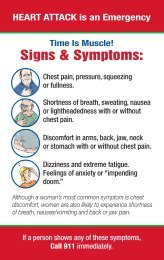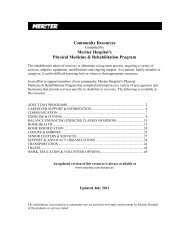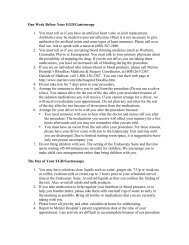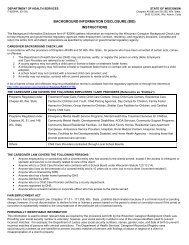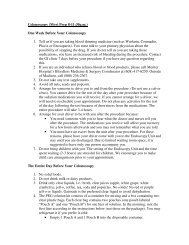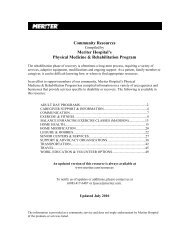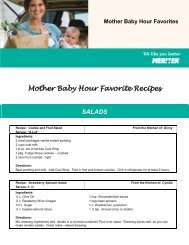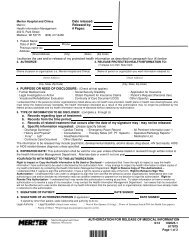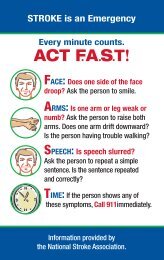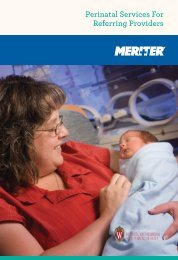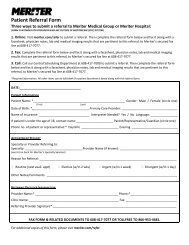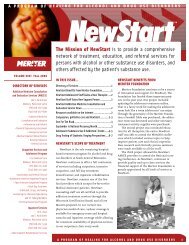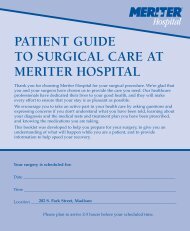A Guide To Your New Family's First Weeks - Meriter Health Services
A Guide To Your New Family's First Weeks - Meriter Health Services
A Guide To Your New Family's First Weeks - Meriter Health Services
Create successful ePaper yourself
Turn your PDF publications into a flip-book with our unique Google optimized e-Paper software.
Hemorrhoids<br />
Hemorrhoids are varicose veins (swollen blood<br />
vessels) in the rectum. You will be able to feel the<br />
hemorrhoids and may notice itching, bleeding or<br />
pain while having a bowel movement. Hemorrhoids<br />
are common during pregnancy because the uterus<br />
increases pressure on the pelvic vessels, which<br />
causes the vessels to swell. The strain of pushing<br />
during your baby’s birth may cause more swelling.<br />
Hemorrhoids are usually most painful the first<br />
few days following your baby’s birth. Here are<br />
several things you can do to make yourself more<br />
comfortable:<br />
• Sit on a donut-shaped pillow.<br />
• Take warm tub baths after 24 hours. (Use the<br />
donut cushion in the tub for comfort, if<br />
necessary.)<br />
• Use Tucks ® Medicated Witch Hazel pads or other<br />
medications your doctor has prescribed for this<br />
area.<br />
• Avoid constipating foods such as cheese, bananas,<br />
etc. Eat high-fiber foods such as whole grains,<br />
fresh fruits and vegetables. Drink extra fluids.<br />
Take a stool softener as needed. See medications<br />
on page 15.<br />
• Try not to put off a bowel movement or be<br />
concerned about your stitches. (During a bowel<br />
movement, press a clean peri pad to your vaginal<br />
area to support your stitches.)<br />
• If you have not had a bowel movement by three<br />
days after delivery, contact your health care<br />
provider.<br />
Swelling (Edema) During and After<br />
Pregnancy<br />
Swelling during and after your pregnancy is quite<br />
common. It is caused by the extra blood and fluids<br />
circulating through your body during your pregnancy.<br />
The swelling will gradually disappear within a week<br />
as your body gets rid of the extra fluid you retained<br />
during your pregnancy. <strong>Your</strong> kidneys will do most<br />
of this, which means you’ll be urinating more than<br />
usual. <strong>Your</strong> skin pores will also work to shed the<br />
extra water, so you’ll sweat more, too.<br />
Is it ever serious<br />
Postpartum swelling is rarely serious and will go away<br />
on its own. However, if the swelling does not resolve<br />
within a week or if you have bad headaches or pain<br />
in your legs, call your health care provider. Also, call<br />
immediately if the swelling is in only one leg or ankle<br />
and is accompanied by severe pain; it could be a sign of<br />
deep vein thrombosis (a blood clot).<br />
What <strong>To</strong> Do For Swelling During and<br />
After Pregnancy<br />
The best thing you can do to minimize swelling is<br />
drink plenty of fluids and eat foods low in sodium<br />
and high in potassium. Here are some other things to<br />
help lessen swelling:<br />
• Keep moving throughout the day. If you have to<br />
stand for long periods, shift your weight between<br />
your legs and stretch your legs periodically.<br />
• Wear support hose to help promote circulation in<br />
your legs.<br />
• When sitting or resting, raise your feet and legs.<br />
• Avoid wearing clothes that are too tight or<br />
uncomfortable.<br />
• Drink plenty of water throughout the day.<br />
• Exercise regularly if possible.<br />
Breasts<br />
• Non-nursing mothers may feel engorged. Cold<br />
compresses, a supportive bra or acetaminophen<br />
may help with breast discomfort. <strong>Your</strong> milk<br />
production will naturally stop in seven to 10 days.<br />
• For information about breast infections, see<br />
page 28.<br />
Breast Self-Exam<br />
Whether or not you are breastfeeding your baby,<br />
continue to do monthly breast self-examination.<br />
Pregnant and lactating women should follow the<br />
recommended guidelines for breast cancer screening:<br />
• Monthly breast self examination<br />
• Clinical breast exam by a trained health<br />
professional every three years<br />
• Baseline mammogram done at the age of 40<br />
• Women between the ages of 40-49 should have a<br />
mammogram every one to two years<br />
Note: these recommendations are for women who are<br />
low risk and have no symptoms of breast cancer. Ask<br />
your provider for specific guidelines if you have risk<br />
factors.<br />
17



